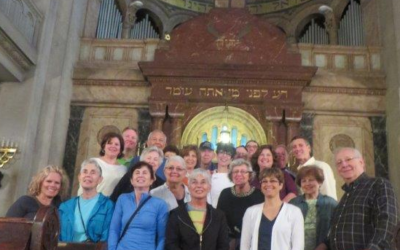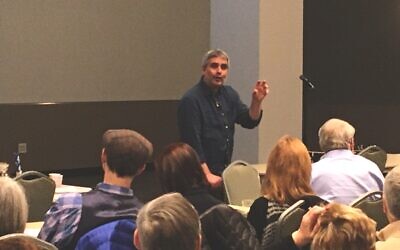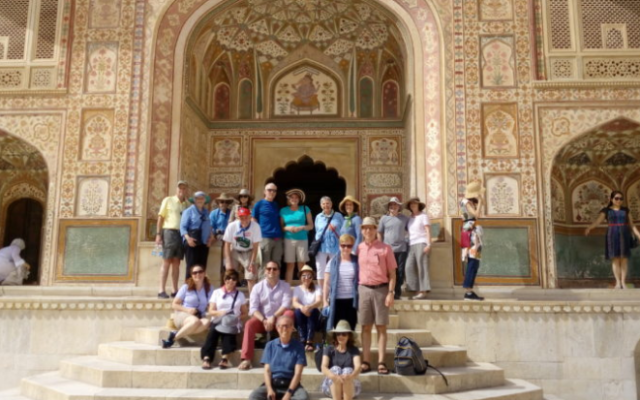Temple Sinai Hosts Travel Scholar
Ahead of Temple Sinai's ambitious travel schedule, scholar and tour guide Jeremy Leigh discusses the ways Jewish travel can bring communities together.
Often when synagogues plan a weekend with a scholar-in-residence they engage a well-known teacher or rabbi or even, as one synagogue did in January, a performer of the music of worship. But for its latest guest scholar, Temple Sinai heard from an authority on Jewish travel.
The scholar is Jeremy Leigh, who teaches Israel studies and modern Jewish history at the Hebrew Union College in Jerusalem. He’s also a professional tour guide who has accompanied numerous groups to Jewish travel sites around the world. But his goal is for Jewish travel to be more than merely seeing the sights.
In his book about the travel experience, “Jewish Journeys,” Leigh describes the trips we take as an opportunity for self discovery.
“Journeys are more than about travel,” he writes. “They comprise the thrilling, challenging, at-times dangerous, and other times depressing encounter with the world beyond. Most importantly, however, they unlock an encounter with oneself.”
In conjunction with Leigh’s visit, Temple Sinai has announced an ambitious schedule of four travel programs this year. Two of the trips are to Israel, another is to Croatia and the Balkans and a fourth is a long weekend in Amsterdam.
Temple Sinai Rabbi Brad Levenberg, who is accompanying the trip to Croatia and the Balkans in June, believes the journeys deepen the Jewish experience.
“Interacting with other cultures and other people helps us to understand what in our own unique Jewish experience is important to us. It also helps us to understand how we’re actually quite similar to so many people all over the world.”

Leigh’s presentation last month, “Let My People Go,” capped his visit to the Sandy Springs synagogue. He took his audience on journeys of the imagination to several different places.
In Mantua in northern Italy, he pointed out in a photograph of a city street, a small piece of metal that sticks out of the wall. It is the hinge of a gate that once closed off the Mantua ghetto, which helps to recall the entire history of the place.
Outside of Auschwitz, he ponders how to direct our gaze at this tragic place. He asked his audience to look not at the buildings but at the railroad tracks and their role in carrying Jews to their journey of death.
In Sarajevo, at the National Museum of Bosnia and Herzegovina, a photograph shows a tour group visiting the famous, historical haggadah of the 14th century. In every generation, he notes, people have risen up to kill the Jews. Here too, in Sarajevo, Jews were killed in the civil war of the 1990s. What kind of a conversation, he questions, could we have about life and death and freedom in this museum that houses this historical book?
In his talk and in his book, he emphasizes the importance of the imagination in travel.

“Journeying to a place where the Jewish drama once unfolded means to acknowledge that imagination and feeling are critical. Jewish journeys are very often about the invisibility of the story, the reality of looking at something that is not there,” Leigh writes in his book.
Rabbi Levenberg also believes that travel can bring people closer together in a synagogue that has grown in recent years to more than 1,500 households.
“One of the great results, for me, of any congregational trip we take, is being able to look out in the congregation during the following Shabbat services. People who didn’t know each other beforehand are now sitting together and worshiping together.”
For Leigh, the experience of group travel as Jews, is similarly profound.
“It is,” he says, “a place where we find each other.”




comments